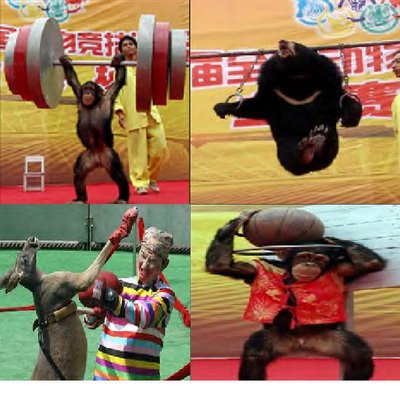Now I know I'm supposed to feel superior to a movie like Jackass #2, which was the #1 movie at the box office last weekend, and had one of the biggest September openings ever. On the surface, it's just a bunch of rich white guys doing dumb stunts because, for whatever reason, they don't have anything better to do, and you get the feeling that even if they did have something better to do, they'd probably chose not to.
But I choose to try harder than that.
I think it is an interesting idea. This is film being used in a different, creative way. Here is a movie that is completely non-conventional and it got people out en masse and I think we should (or at least can) consider why.
Jim Emerson, editor of RogerEbert.com, recently wrote on his blog,
Scanners "I was trying to imagine what it would be like if the conversation about movies (whether academic study, criticism, or casual after-movie talk) ended with the final credits. What if the movie was just over and you never thought about it or discussed it with anyone again? It's unthinkable..." To put it differently, Pepperdine film guru (and recently
published author) Michael Gose's oft-repeated creed on movies is "the unexamined film isn't worth watching." And yet, this is exactly the way most people seem to approach film. Hopefully, not you. If that is you, hopefully you will reconsider that approach.
So despite having not seen it as of yet (and in all likelihood I never will, though I may convince myself to by the end of writing this), I will attempt a discussion of why this movie, Jackass Number Two, matters.
The movie exists because the TV show and the first movie were successful. I was never a fan of the show and didn't see the first movie, but I know a little bit about how their act works and know that you can do much more with it in a movie than on a TV show because you don't have to appease advertisers sensibilities. The film format, with a concept such as theirs, gives complete creative freedom.
Movies, through their history, have been predominantly used to tell a narrative, chronological story. Occasionally, something comes along that uses the medium in a completely different way, from Andy Warhol making a 5 hour movie of a man sleeping (aptly titled, "Sleep"; some referred to his early films as "stillies" as opposed to "movies"), to Godfrey Reggio's intriguing, if repetitive, 'Koyaanisqatsi', to the more recent "Waking Life" by Richard Linklater; appropriating the art form to suit the individual needs of the artist in expressing himself/herself, rather than forcing oneself into the constraints of the mainstream.
Experimental or alternative cinema has almost always been pushed to the margins, deemed unfit for mass consumption, because it doesn't fit with traditional principles and expectations of filmmaking. I don't know that this "Jackass" franchise of films stands up to those mentioned above in terms of quality [once again, I haven't seen them], but it certainly falls into that vein. They are telling their story, but in a way unlike anything else in the theaters today. This isn't documentary filmmaking in the sense that we think of it, and yet isn't it exactly that. It isn't fiction, but it isn't exactly 'reality', as the situations are all contrived. It's the odd confluence of reality TV, circus clowns, and the Three Stooges. It doesn't fit anywhere. It defies defintion. It is simply "alternative" cinema.
The difference being, this time it's really popular.
Yes, these boys appear to have created a whole new genre for themselves: Alt-Pop cinema. They are wholly popular, and at the same time wholly non-conventional. Scholars maintain today's audiences are cinematically sophisticated enough to appreciate something different from the norm. This proves it. People can, and at times, want to, consciously or subconsciously, stretch themselves beyond the straight-ahead narrative style.
These films clearly express the point(s) of view of their creators and many identify with or aspire to those ideals, and as such, it resonates with the mass audience in a way alternative cinema never has before in this country.
In Europe, alt cinema gained popularity in the 1960's, particularly the
French "New Wave". But in this country, we've always stayed toward the more traditional.
We can intellectualize further about these films as well, commenting about their implications on voyeurism, the idleness of youth, the American culture of excess, the idle rich, sadism, exhibitionism, anti-establishmentarianism, and so on.
Of course, no one (except me, I guess) would dare write about those things in connection to a movie like Jackass Number Two, for fear of being termed an out-of-touch aesthete who is trying to ruin the fun (and because people who know or care about such topics aren't likely to have seen it [i.e. me], and those who will go see it aren't likely to care or understand.) Just noticed I wrote the words, "me" and "I" consecutively in the first sentence of this paragraph. How delightfully, unintentionally self-absorbed, but I digress.
I think if you look past the apparent sophomoric facade, to what is really going on to cause these young men to do what they do, record it, and exhibit it to you (for a nominal fee), you could find your brain engaged with even the seemingly most trivial of cinematic experiences. Think of it, Johnny Knoxville: Cinematic Revolutionary.
Or maybe I'm just an out-of-touch aesthete trying to ruin the fun.
